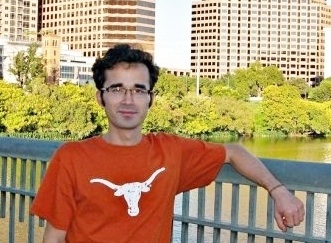November 22-2013
An American researcher says the work being done in Texas by Omid Kokabee, the young physicist now in Evin prison, could have helped Iran enrich uranium in a way US satellites could not locate. Kokabee was jailed after refusing to join Iran’s nuclear program.

. . . jailed
Human rights groups, scientists and backers of academic freedom are now stepping up efforts on behalf of Kokabee, who was sentenced to 10 years in prison in May 2010 by the Islamic Republic.
The Voice of America (VOA) reports that Kokabee is to be featured in an upcoming Amnesty International panel discussion in Washington, DC, on academic repression in Iran. In September, Kokabee was awarded the 2014 American Physical Society’s Andrei Sakharov Prize for what the society described as his “courage in refusing to use his physics knowledge to work on projects that he deemed harmful to humanity in the face of extreme physical and psychological pressure.”
Kokabee, 31, is considered among the brightest physicists of his generation. He graduated from Iran’s Sharif University of Technology and then went to Spain to obtain a master’s degree from Barcelona’s Institute of Photonic Sciences.
In 2010, he transferred to the University of Texas at Austin (UTA) to pursue studies in laser physics. In his first semester, he worked as a teaching assistant, for which he received a stipend, and conducted research into the design and development of tunable lasers—superfast lasers that can be controlled and tuned over a broad wavelength range, something that cannot be easily done with conventional lasers.
Ellen Huchinson, a friend and fellow UTA graduate student, told VOA the technology has many applications—from astronomy to medicine to enriching uranium.
“People are trying to figure out how to enrich uranium with lasers, and if that is successful, instead of using a large building with a centrifuge, tunable laser technology would basically make it possible to use a table-top device,” she said.
In other words, this technology would allow researchers to enrich uranium in small plants or factories that would not readily be seen in satellite imagery.
Omid made several trips to Iran while he was in Spain because his mother had health problems, Huchinson said. She believes this may have created suspicions in Iran.
“Omid went back to Iran in December of 2010 after the semester [in Texas] had ended,” Huchinson said. “And while he was visiting his family, he was approached by the Iranian nuclear energy organization to work for them and he said no.”
As it turns out, this was not the first time authorities had made him offers. “Since 2005, I have been invited several times to work as a scientist and technical manager for military and intelligence projects,” Kokabee said in a letter to a former university roommate, translated by Nature magazine.
“I was invited to work in the Research Center of Malek Ashtar University in Esfahan [which is associated with the Pasdaran]. I was offered a doctorate scholarship by the Atomic Energy Organization of Iran [AEOI] and I was invited to produce proposals for the projects led by the Defense Industries Organization,” Kokabee wrote. He said he turned down all the offers.
Kokabee was arrested at the Tehran airport in January 2011 as he was attempting to return to Texas and charged with “gathering and conspiring against the national security.”
He spent months inside Evin prison, where he said he was threatened and intimidated into making a written confession. In letters smuggled from prison, he said he believes the real reason for his imprisonments was his refusal to cooperate with Iranian military projects.
He was tried in May 2012 along with a dozen men accused of spying for Israeli and US intelligence. He said he was not allowed to speak with his lawyer, Saeed Khalili, and prosecutors presented no evidence against him. He was charged with espionage and receiving income—presumably his UTA stipend—from a hostile government and given 10 years in jail.
Like all teaching assistants, the University of Texas provided him financial support, but his professors stress that these funds did not come from the US government.
Omid has now spent nearly three years in Ward 350 of Evin prison, dubbed the “Hotel,” where many of Iran’s political prisoners are housed. A source close to Omid, who asked VOA not to name him, said he is allowed visits only by immediate family members for a total of 20 minutes each week. “Even his mother cannot hug him. Only rarely do they have meetings in person in which his mother can hug him.”
“Unfortunately,” the source said, “his physical health is not good. He suffers from kidney and stomach problems that he had from his childhood.Ö His requests to be sent to a hospital outside prison for a visit or diagnosis have been denied.”
The source told VOA Omid stays busy by tutoring fellow inmates in English, Spanish and French. He has translated two books from English into Farsi. He recently submitted a paper on lasers to an annual Iranian conference on physics. “He has been invited for an oral presentation, but unfortunately, they did not let him attend,” the source said.
